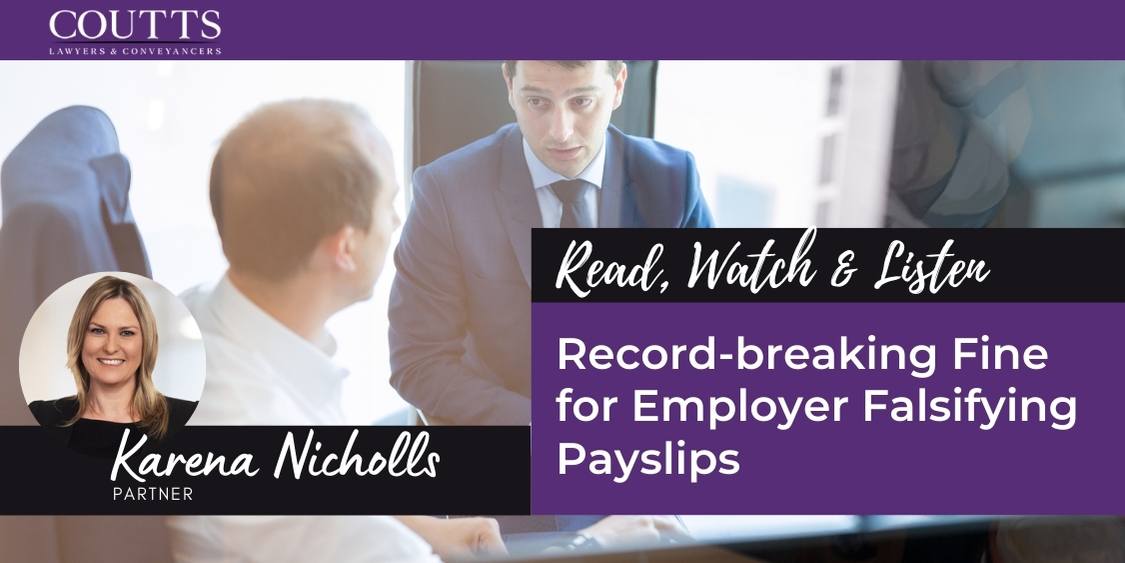KEY TAKE-OUTS
- Employers are required to make and keep accurate and complete records for all employees
- Keeping or providing misleading employee records may result in serious consequences
- A Brisbane fast-food operator has been fined $204,000 for falsifying payslips
- It is important for employers to stay up to date with their obligations under the Fair Work Act
Payroll record keeping requirements in Australia
Australian companies are required to be compliant with legislation around record-keeping and payslips. When records are incorrectly retained or provided, severe penalties may apply to employers. This means it is important for Employer’s to be aware of their roles and responsibilities when providing payslips and retaining employee information.
What record keeping obligations do employers have as outlined by the Fair Work Act?
The Fair Work Act 2009 (“FW Act”) prohibits employers from keeping or knowingly or recklessly providing false or misleading employee records or payslips to staff, the Fair Work Ombudsman (“FWO”), a Fair Work Inspector, or a FWO officer exercising certain powers.
Employee records must be:
- In a form that is readily accessible to a Fair Work Inspector
- Be in legible form and in English
- Be kept for seven years
- Not be altered unless for the purposes of correcting an error
- Not be false or misleading to the employer’s knowledge
What does a payslip need to contain?
Are employers required to provide payslips? As an employer, it is essential to provide employees with a payslip which meets all legal requirements. According to the FW Act, the following are required for all Employee payslips:
- Company’s registered name
- Employer’s Australian Business Number
- The full name of the employee
- Pay period
- Date the payment was issued
- Gross and net pay to the employee
- The amount of tax withheld
- Hourly rate calculation
- Any additional deductions
- Loadings, penalties and allowances
- Super contributions
- Salary to date
What are the penalties for a business not keeping the required records?
Providing false or misleading employee records or payslip information can be penalised at a maximum of $13,320 per breach for an individual or $66,600 for breach for a corporation. In some cases, knowingly giving or providing false or misleading information or documents to officials may lead to a criminal offence.
In addition to penalties for not keeping records, the FW Act includes a presumption in favour of a person who makes wage-related allegations in a court proceeding where an employer has failed to meet their record-keeping and payslip obligations or failed to make records available for inspection. Storage of inaccurate payslips and records may make it difficult or impossible to disprove any underpayment claims made by former or current employees.
Case study regarding employer penalties for false and deceptive record keeping: FWO v Riddhi Siddhi Pty Ltd
Recently, the FWO has secured a total of $204,000 in penalties against the operators of Brisbane fast-food business, Riddhi Siddhi Pty Ltd (“Riddhi Siddhi”). Riddhi Siddhi was investigated after the FWO received a request for assistance from a Nepalese visa holder who was employed as a casual kitchen hand from April 2018 to August 2019.
The kitchen hand had worked up to 66 hours per week, being paid between $11 and $13 an hour which was far below what the employee was entitled to.
A majority of the penalties imposed to Riddhi Siddhi were in relation to their breach of the FW Act by giving false or misleading payslips to the employee and failing to comply with a Compliance Notice.
The FWO found that Riddhi Siddhi had falsified records to make it appear that the Nepalese worker had been paid Award rates and provided the records to the FWO in an attempt to obscure the truth and to ensure that any proper investigation was never able to be pursued.
The employee was able to prove his case as he had taken photographs of each of the time sheets, was able to track his movements using his mobile phone and public transport card over six months of his employment.
The Compliance Notice required the company back-pay the worker the unpaid entitlements. Riddhi Siddhi have since back paid the worker $59,400, plus interest and superannuation.
What are the consequences if a company doesn’t comply with the Fair Work Act?
As an employer, it is important to make sure you are complying with all aspects of the Fair Work Act, especially regarding the storage and distribution of employee records and payslips. As outlined above, retaining false records can lead to an investigation by the FWO and severe penalties may apply.
If you have any questions or concerns regarding your current procedures or processes, please contact our friendly Employment Law team to discuss your obligations and responsibilities.
ABOUT KARENA NICHOLLS:

Karena is a Partner at Coutts and is the Head of our Injury Compensation (with extensive knowledge in personal injury) and Employment Law teams. She is passionate and dedicated to helping her clients understand their rights and obligations and advising them on the best course of action to achieve their desired outcomes. It is her practical and client-orientated approach that has attributed to her authentic reputation positioning her as a highly regarded compensation and employment lawyer.
For further information please don’t hesitate to contact:
Karena Nicholls
Partner
info@couttslegal.com.au
1300 268 887
Contact our Employment Lawyers Today.
This blog is merely general and non-specific information on the subject matter and is not and should not be considered or relied on as legal advice. Coutts is not responsible for any cost, expense, loss or liability whatsoever to this blog, including all or any reliance on this blog or use or application of this blog by you.



